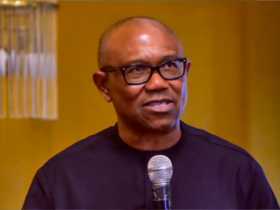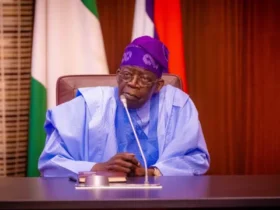The Financial Times has criticized Chief Bola Ahmed Tinubu for his economic policies, stating that they have caused the naira to plummet and triggered the worst cost of living crisis in a generation.
According to an editorial published on July 17, Tinubu’s removal of fuel subsidies and the decision to float the naira have significantly worsened economic conditions in Nigeria.
The editorial describes Tinubu’s economic approach, termed “Tinubunomics,” as disjointed and ineffective, leading to soaring inflation and increased hunger levels.

“Tinubunomics” is so disjointed it barely deserves the name,” Financial Times wrote, warning that “Shock therapy will probably fail if important adjustments are not made.”
The newspaper disclosed that under Tinubu’s watch, “Hunger levels are soaring and millions of children are foregoing meals and school,” adding that the president’s economic policies, fuel subsidy removal and floating of the naira, have “pushed tens of millions of already impoverished people deeper into misery.”
“In the nearly 15 months since Bola Tinubu became president, he has forced his 220mn fellow Nigerians to swallow some bittermedicine. He removed a generous fuel subsidy, one of the few benefits citizens receive from their inefficient and corrupt state.
“He allowed the country’s currency, the naira, to enter freefall, fuelling imported inflation and triggering the worst cost of living crisis in a generation. These measures have pushed tens of millions of already impoverished people deeper into misery,” Financial Times added.
According to Peoples Gazette, Ajuri Ngelale, spokesperson for Mr Tinubu, could not be reached for comment on the Financial Times criticism. Text and WhatsApp messages sent to Mr Ngelale seeking a response to the Financial Times article went unreplied.
Bayo Onanuga, another media aide for Tinubu’s government, responded to a text from the Peoples Gazette asking to be shown the Financial Times story. After reviewing the report, he claimed that it was “not new,” as it had been published since “last week Thursday,” and accused The Gazette of “quoting the paper out of context,” they further reported.
However, when informed that the Financial Times editorial was published on July 17, just three days ago, and asked to respond to Financial Times criticism, Mr Onanuga did not reply.
This criticism from the Financial Times echoes earlier assessments from international media outlets. In June, the New York Times reported that Nigeria is enduring its worst economic crisis in decades under Tinubu’s leadership, characterised by spiking inflation, a declining national currency, and widespread food insecurity.
Tinubu has attributed the current economic difficulties to the legacies of his predecessors, despite the escalating crisis under his administration.
While Nigeria’s economic challenges predate Tinubu’s presidency, his policies—particularly the removal of the fuel subsidy and the decision to float the naira—have resulted in petrol prices soaring from N145 to N710 per litre and the naira depreciating to approximately N1,500 against the dollar.
While Nigerians plan nationwide protests against Tinubu’s government, the effectiveness of Tinubu’s policies remains under intense scrutiny both domestically and internationally.
Peoples Gazette
Follow the Parallel Facts channel on WhatsApp: https://whatsapp.com/channel/0029VaCQSAoHgZWiDjR3Kn2E









Leave a Reply